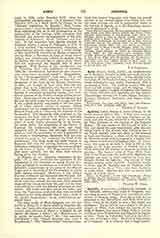

Agricola, ALEXANDER, a celebrated composer of the fifteenth century, and pupil of Okeghem, was, according to some, of Belgian and, according to other writers, of German, origin. Born about 1446, he was educated in the Netherlands and lived there some time. Even in his youth he was a fine singer and performer. Up to 1474 he was a singer in the ducal chapel, at Milan, then entered the service of the Duke of Mantua, then that of Philip, Duke of Austria and King of the Netherlands, following him to Castile, in 1505. There (at Valladolid) he died in the following year, at the age of sixty. He stood in high esteem as a composer. It is believed that a large number of his compositions are still in the libraries of Spain, awaiting a publisher. Of those published, Petrucci printed (1502-3) thirty-one songs and motets, and a volume of five masses bearing the titles: “Le Serviteur”, “Je ne demande”, “Malheur me bat”, “Primi toni”, “Secundi toni”.
J. A. VOLKER

